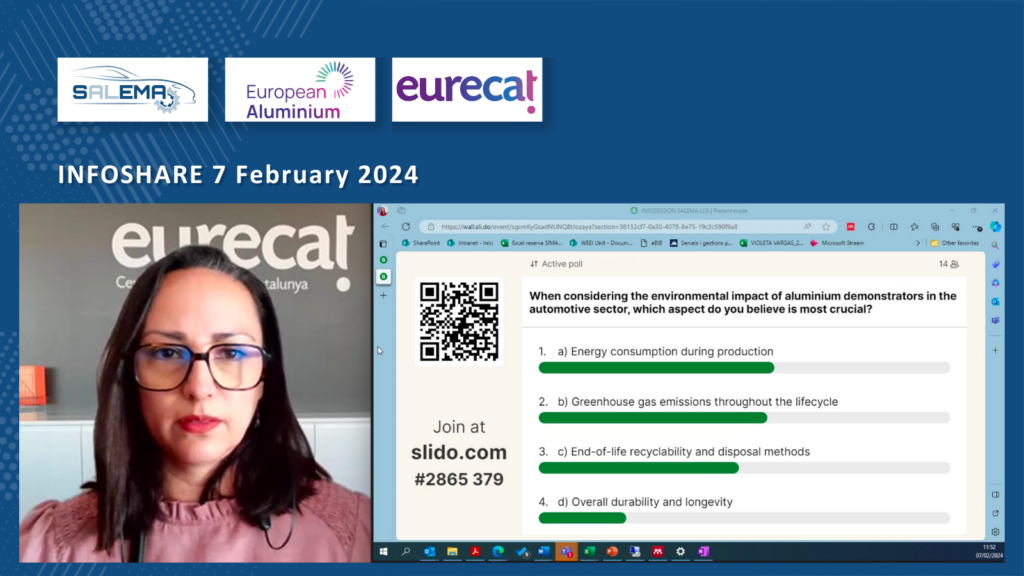
SALEMA partners presented near-final results to around 50 members of European Aluminium’s Automotive & Transport group and Innovation Hub on 7 February 2024—an important chance for stakeholder feedback. Of particular interest were SALEMA’s achievements in increasing the use of aluminium scrap and recycled content in new aluminium alloys for car parts and the potential of ‘MULTIPICK’ scrap sorting technology to enhance quality.
It was encouraging how well participating aluminium companies received the project. There were questions about whether automotive companies would accept the car parts that SALEMA partners created to demonstrate the real-world applicability of the new alloys. However, this highlighted the benefit of such projects involving all the players in the value chain, which is the approach taken in SALEMA.
Near-final results
Manel da Silva López of Eurecat, technical coordinator of SALEMA, outlined its primary objectives. These include reducing demand for critical raw materials (CRM) in aluminium alloys by harnessing end-of-life scrap and developing new alloys with reduced CRM content while maintaining desired properties. Through collaboration between 16 partners covering the entire aluminium value chain, SALEMA conducted tests to validate the new alloys across various techniques commonly used to manufacture parts for cars, including high-pressure die casting, stamping and extrusion. Initial tests showed promising results, with selected variants demonstrating satisfactory mechanical properties and corrosion resistance, paving the way for more sustainable aluminium and car-part production processes.
Automotive component manufacturer Gestamp is one of the SALEMA partners involved in validating the new alloys in specially-produced car components. Gestamp programme manager Juan José Matarranz outlined activities to simulate and test alloys with up to 85% recycled content in the stamping process—in which sheets of the metal are shaped around moulds. By testing the formability and other properties of such high-recycled-content alloys in the creation of a ‘B-pillar’—a critical component of a car’s safety cage that protects passengers—Gestamp demonstrated the feasibility of using such alloys without compromising quality.
Grégory Lewis of Groupe COMET showcased the ‘MULTIPICK’ scrap-sorting technology, which already evolved from a bench-scale prototype to an industrial-scale plant. Thanks to a new artificial intelligence-based algorithm that directs the system’s robot scrap pickers, which was developed in SALEMA by Robert Baudinet from the University of Liège, the technology uses multiple sensors to discern between various types of aluminium among other pieces of scrap on a conveyor belt. This signals a significant stride towards refining the separation process, meeting market demands for specific aluminium families, and enhancing the circularity of metal recycling and processing.
Violeta Vargas Parra of Eurecat (pictured above) presented the results of the project’s Life Cycle Assessment (LCA) of environmental impacts across SALEMA’s different demonstrator car parts and aluminium alloys. The study revealed the substantial effects of aluminium alloy production and processing, and indicated the impacts would be significantly reduced with the use of up to 90% recycled material in alloys. This underlines the importance of analysing different options to achieve sustainability goals and the contribution that SALEMA’s results can make to sustainability within the aluminium and car production industries, as well as the importance of including all life cycle stages. Accordingly, subsequent SALEMA results will also include the vehicle use and end-of-life stages.
Feedback and conclusions
Key points of discussion with the event participants included scrap pre-treatment methods and the effects of scrap on alloy quality and industrial production. This underscored the complexity and necessity of optimising recycling processes. Manel da Silva explained that SALEMA partner Ford was running tests to validate the properties and suitability of parts produced using new alloys. He also clarified that pre-treatment, such as removing any organic layer from end-of-life scrap, is essential to ensure high-quality scrap and has been performed in the project. Juan Jose Matarranz confirmed that the ‘SALEMA alloys’ with a higher amount of aluminium scrap maintain the same composition as the 6000 series aluminium alloy family, which can be thermally treated to enhance strength—properties that are useful in the stamping process.
Overall, the SALEMA project’s presentation showcased advancements in aluminium alloy development, scrap utilisation, and recycling technologies, signaling a promising outlook for sustainable aluminium production in the automotive industry and beyond.
Final results soon!
Final results of the SALEMA project will be presented in Brussels on 21 March 2024. This event will include a display of the car-parts produced to demonstrate the viability of the SALEMA aluminium alloys for industrial use. Project partners from across the value chain will be available to discuss their results and implications for industry and research, as well as related policy issues. Guest presenters from related fields and sectors will help to provide a wider context for the discussions about reducing Europe’s dependence on imported critical raw materials and achieving more sustainable aluminium production for use in the automotive industry.
Anyone with an interest in these topics is welcome to join us!
Registration is open until 15 March 2024 at 23:59 CET.
- REGISTER: bit.ly/SALEMA2024
- Further details
Further information
European Aluminium is a SALEMA partner with a role in boosting impact of this EU-funded project. It organised the 7 February online infoshare with its stakeholder groups as part of these project activities.